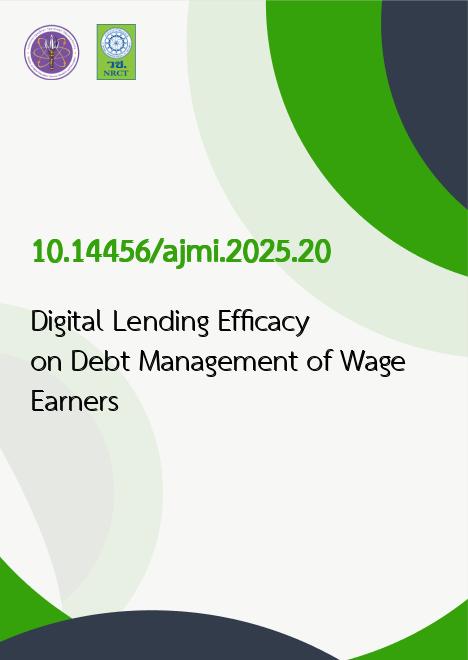
|
Digital Lending Efficacy on Debt Management of Wage Earners |
|---|---|
| รหัสดีโอไอ | |
| Creator | Danica Nelsen Esperanza |
| Title | Digital Lending Efficacy on Debt Management of Wage Earners |
| Contributor | Leovigilda L. Bithay, Jiomarie B. Jesus, Chesa Ople-Alviola, Jeffy M. Sumilhig, Genessa L. Basilisco |
| Publisher | Cebu Technological University |
| Publication Year | 2568 |
| Journal Title | ASEAN Journal of Management & Innovation |
| Journal Vol. | 12 |
| Journal No. | 2 |
| Page no. | 111 - 127 |
| Keyword | Digital Lending, Debt Management, Financial Inclusion, Wage Earners, Financial Literacy |
| URL Website | https://so13.tci-thaijo.org/index.php/AJMI |
| Website title | AJMI -ASEAN Journal of Management & Innovation |
| ISSN | 2351-0307 |
| Abstract | This study examined the effectiveness of digital lending in shaping the debt management behaviors of wage earners in Cebu City, Philippines, amid the increasing presence of financial technology in emerging economies. Guided by the Technology Acceptance Model (TAM) and the Financial Capability Framework, a descriptive-correlational design was used to analyze how the dimensions of digital lending accessibility, usage, and quality impact three key debt management strategies: STOP (budget restraint), PAY (repayment behavior), and CAUTION (informed borrowing). Using simple random sampling, 100 wage earners participated in a structured survey, and data were analyzed with descriptive statistics and multiple linear regression. The results showed that perceived quality of digital lending significantly affected PAY and CAUTION behaviors, while frequent usage was negatively related to STOP practices, revealing a behavioral paradox where greater access might reduce financial restraint. Accessibility, though rated positively, did not have significant effects. These findings suggest that digital lending systems should be combined with strong financial education, ethical platform design, and regulatory support. Therefore, the study recommends a targeted Financial Inclusion Program that includes digital debt literacy, transparent lending practices, and borrower protection measures to promote responsible and sustainable financial behavior among wage earners. |
